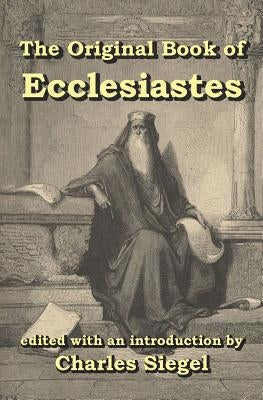Before you leave...
Take 20% off your first order
20% off
Enter the code below at checkout to get 20% off your first order
Discover summer reading lists for all ages & interests!
Find Your Next Read

"There is a just man that perisheth in his righteousness, and there is a wicked man that prolongeth his life in his wickedness. Be not righteous over much; neither make thyself over wise: why shouldest thou destroy thyself?"
Could they admit that Solomon said we should not try too hard to be righteous and wise, because it would make life more difficult?
It is likely that this book would not have been included in the Bible if earlier scribes had not added other sayings attributed to Solomon, which made it more acceptable, but which also made it self-contradictory and difficult to understand.
This edition shows that the original Ecclesiastes was influenced by the Greeks and makes a point that seems very modern: since the traditional religious worldview has been replaced by a materialistic worldview, we live in an absurd, meaningless universe.
This book proves the controversial point that Ecclesiastes was influenced by the Epicureans by identifying, for the first time, a quotation from Lucretius that states the same idea as Ecclesiastes 1:7: "All the rivers run into the sea; yet the sea is not full; unto the place from whence the rivers come, thither they return again."
By removing the sayings that were added by later scribes, this book lets you read the original version of Ecclesiastes and see how much more coherent and compelling it is than the received version that is in the Bible.
Author: Charles Siegel
ISBN-10: 1941667015
ISBN-13: 9781941667019
Publisher: Omo Press
Language: English
Published: 07/21/2014
Pages: 104
Format: Paperback
Weight: 0.28lbs
Size: 7.99h x 5.24w x 0.25d
Thanks for subscribing!
This email has been registered!
Take 20% off your first order
Enter the code below at checkout to get 20% off your first order